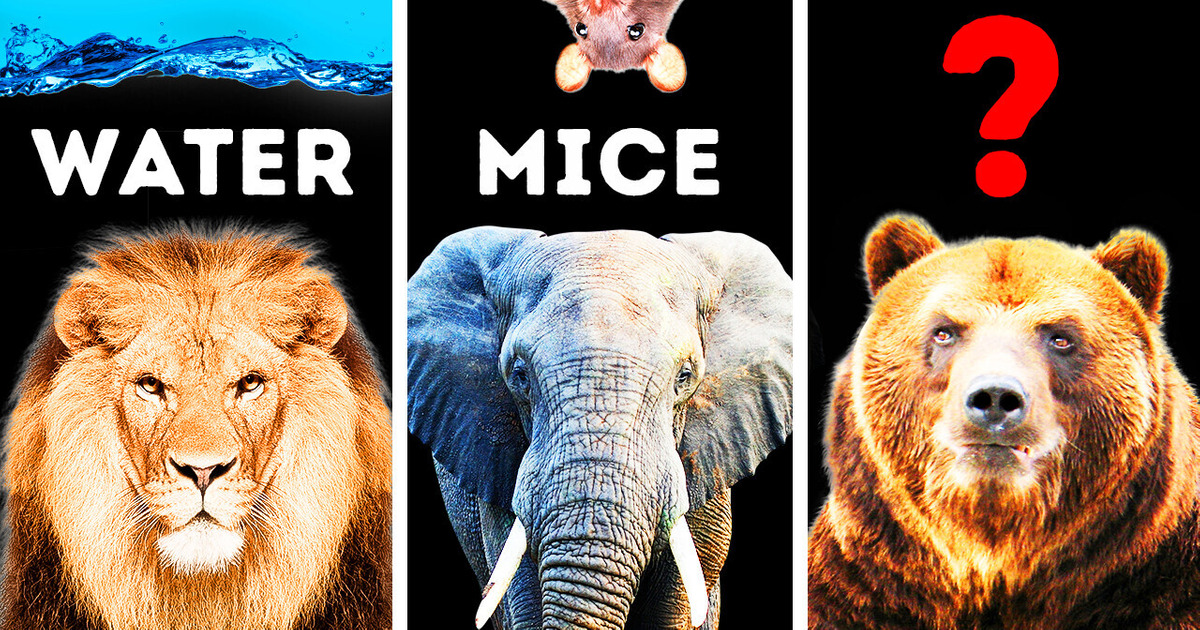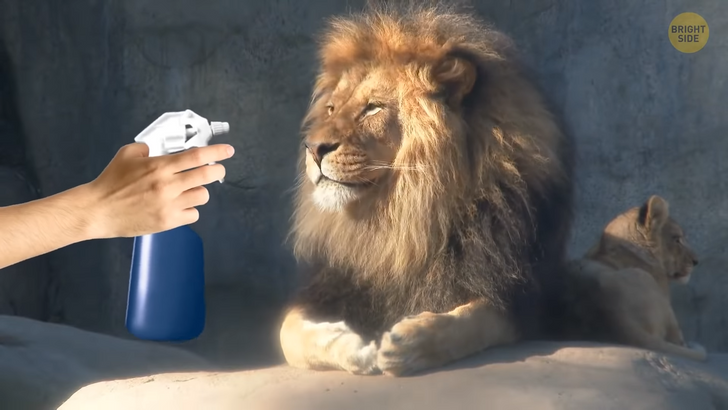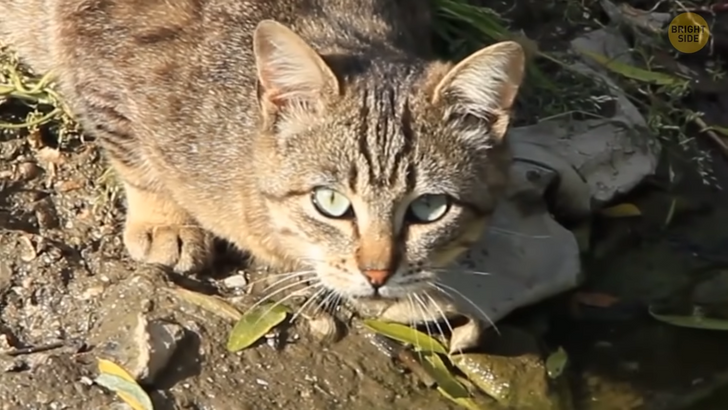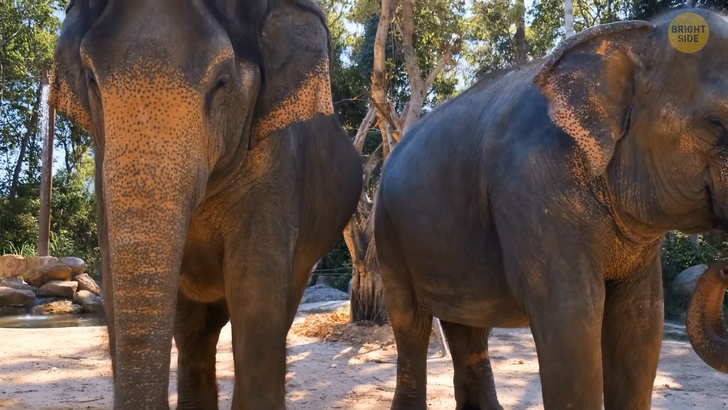the TV show Mythbusters proved that Elephants are, in fact, afraid of mice. They also demonstrated that it wasn't just the suprise at seeing a mouse that caused the reaction.
4 Animals That Are Afraid of Unexpected Things

Lions, elephants, and bears. Three of the most beautiful yet intimidating members of the animal kingdom. But what intimidates these creatures? If anything? You might be surprised! Let’s take a look!

How about we start with the universally recognized King of the Jungle — the lion! We’ll get to the elephants in a moment, but there is actually one in the room. You know the one that claims that a certain jungle cat is afraid of the most vital substance known to man.
A small hint — it covers 70% of Earth’s surface! So, is it true? Is the ferocious lion afraid of water? It’s actually a myth. Lions enjoy taking a dip in the water because it allows them to cool off. This makes sense if you think about the climates the creatures have to face. Temperatures in a savanna climate range from 68˚F and 86˚F.
You know all of us humans hit the beach whenever the weather is like that. So why should we expect anything different from the lion? Especially given that the creatures typically carry around between 280 lbs and 420 lbs pounds of weight, as well as a thick coat of fur. The ironic thing about this whole ’Lions are afraid of water’ myth is that they’re actually fantastic swimmers.

The same goes for all of your other favorite large cats from these warm-weather climates — such as tigers, leopards, jaguars, and ocelots. It’s actually large cats from cold climates that do their best to avoid water. This applies to such felines as bobcats, lynxes, and snow leopards. The latter lives in places like the cold alpine tundra biome — that’s a rocky mountainous area. Temperatures there, on average, get as low as 33˚F.
Again, it makes perfect sense that these big cold-weather cats despise water. Getting their fur coats wet would dampen their chances of staying warm. Pun intended. I don’t think you have to look too far to piece together where this ’Lions are afraid of water’ myth comes from.
In fact, there’s a good chance for some of you watching this video that the reason is near your computer screen right now, jumping around and causing mischief. That’s right, we may have jumped ourselves — to the conclusion that certain behavioral aspects of our own pet cats would match that of a lion!

House cats, though related to all of the previously mentioned big cats, are not actually directly descended from them. They instead have developed over millions of years from a single wild ancestor that still exists in the wild today — the Near Eastern wildcat. As water is not plentiful in the Middle East, these cats were not exposed to it to any great degree. Like their descendants, they only appreciate it as a food source.
As you likely see with your pet, they hardly bathe, swim, or interact with water in general. Lucky for them, they don’t even need to. These domestic felines use their tongues to clean themselves. They can do this because their tongues have tiny hook-shaped papillae. They assist cats in grooming out knots and keeping the coat clean, sweet-smelling, and in overall immaculate shape.

Cats, in general, are individualistic creatures. And you may be screaming at your screen right now proclaiming that your cat, in fact, loves water, and this is definitely possible. Some cats even like to play with water — for example, drips from the tap or bubbles in the bath. There are specific breeds of house cats that are known to enjoy the aqua life more than others.
The Turkish Van, for example, is also appropriately known as the Swimming Cat. It’s believed that the breed developed an affinity for water by swimming in Lake Van to cool down. This lake is in the area the animals evolved from. Moving on to a problem a cat definitely doesn’t have to deal with! Have you ever heard of musophobia, also known as suriphobia? Both words are valid names for a fear of mice and rats!

There is a common belief that one particular animal that has this fear is the beautiful elephant. That’s right, the same animal that, depending on the species, stands at a height of roughly 10 ft and weighs about 9,000 lb. It’s supposedly afraid of a creature that is a mere four inches in length and weighs less than one pound. But why did this belief appear?
Well, the reasoning for this rumor is based on the possibility that elephants are paranoid about mice climbing inside their trunks! If a mouse succeeded in doing this, there would be a potential that it could cause irritation and blockage within the trunk. I’m not trying to be the guy who spoils parties, but it looks like this belief is also a myth.
Researchers claim that there’s no concrete evidence that suggests elephants are afraid of mice. The most they’ll concede is that the giant animal may sometimes take fright by the sudden appearance of the tiny rodent. Which is the exact same for us!

Experts also claim that even if a mouse did get inside an elephant’s trunk, the latter could effortlessly blow it back out with a puff of air. There’s also some evidence that, in most cases, the animal remains unbothered by rodents and even allows mice to climb on their heads and trunks. Researchers are sure that as long as an elephant is healthy, there’s no other animal that it fears simply because of its size. So, lions aren’t afraid of water; elephants don’t seem to be afraid of mice.
Then, are any of these animal fear rumors real? We’re probably going to be left just as disappointed by asking if a bear has any legit fear, right? Well, ladies and gentlemen, please give a round of applause for none other than people’s best friend!
That’s right; bears do feel quite uncomfortable whenever they are around dogs. And all this despite a very distant genetic link to them! When the two creatures encounter each other, the dog has the ability to chase, intimidate, corner, or antagonize the bear. As for the powerful animal, it will instead try to avoid any run-ins with the dog.

There’s even a type of Finnish dog breed known as the Karelian Bear Dog. This dog species is specifically used for standing up to large animals, such as bears! This dog has a great sense of direction, body flexibility and control, courage, a sense of smell, and persistence!
So, does this mean you can walk with your dog through an area known to have bears and feel absolutely calm and confident because of the presence of your loyal companion? Not really. Despite the fact that bears may be nervous around dogs, we can’t forget their size and power.
The American Black Bear can reach a height of nearly 7 ft and weigh up to 660 pounds. If a mother bear has nowhere to run or feels that her cubs might be in danger, it’s extremely possible that she will lash out — which can only mean big trouble for you or your dog.

So, nobody should ever test this theory! Instead, if you’re ever planning to visit an unknown area with your dog, you should first plan ahead and familiarize yourself with the wildlife you may encounter there! Because you never know what a bear will do when it notices you and your pooch. Especially given their mild case of cynophobia — which is the name given to a fear of dogs! At least we were able to find one genuine fear of another animal out of these three tough members of the animal kingdom!
Weird that a dog, something that gives so many of us such joy and comfort in our own homes, is still the creature that’s brave enough to take on a bear if need be! Well, not all heroes wear capes; some just wear fur and a dog collar. Why don’t we take a look at what frightens these great companions of ours? Ever wondered why your own dog becomes uncomfortable when it hears loud noises?

The degree of fear differs in each dog. But it’s the simple unpredictability of thunder and flashing lightning or loud bangs that accompany firework displays that cause your dog uneasiness. The inability to understand what’s causing this deafening noise may cause your dog to tremble, tuck its tail between its legs, or even run away from home!
Another thing that can really frighten our loyal pets is when we leave them all alone by themselves. This can, unfortunately, lead to being a nightmare for your next-door neighbors because a common symptom of this fear is excessive barking! This fear may also cause problems closer to home!
Ever asked yourself why your dog chewed up your sofa? Housebreaking accidents are typical when a dog has separation anxiety! You can’t stay mad at your dog for long, though, right? Your pooch will make it up to you when you guys run into a bear!
Comments
Related Reads
20+ Photos That Would Be Good Shots, but by “Accident” Turned Out to Be Masterpieces

A Family Adopted a 6-Years-Old Orphan Only to Later Find Out She Was an ADULT DWARF

I Cut Off My Parents After They Demanded My Inheritance—and I Don’t Regret It

12 Moments That Show Romance Is Really About Small Acts of Kindness

15+ Stories That Prove Some House Guests Are Impossible to Forget

I Refuse to “Show Dedication” by Working an Unpaid Weekend

I Was Fired for My Age, Now HR Is Begging Me to Return

15 Times People Refused to Be Mean—And Kindness Proved More Powerful

My Dad Refused to Come to My Wedding, but I Still Asked for the Gift

My Cousin Uninvited Me to Save Money—My Petty Revenge Was Absolutely Worth It

I Refuse to Adopt My Dying SIL’s Baby—Her Last Words Left Me Frozen

I Refuse to Help My Coworker Who Treats My Kindness Like an Obligation
